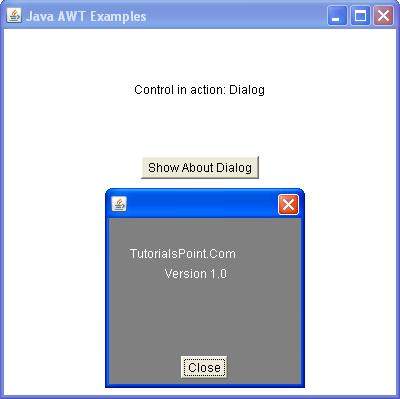
- AWT - Home
- AWT - Overview
- AWT - Environment
- AWT - Controls
- AWT - Event Handling
- AWT - Event Classes
- AWT - Event Listeners
- AWT - Event Adapters
- AWT - Layouts
- AWT - Containers
- AWT - Menu
- AWT - Graphics
AWT - Useful Resources
AWT Dialog Class
Introduction
Dialog control represents a top-level window with a title and a border used to take some form of input from the user.
Class declaration
Following is the declaration for java.awt.Dialog class:
public class Dialog extends Window
Field
Following are the fields for java.awt.Image class:
static Dialog.ModalityType DEFAULT_MODALITY_TYPE -- Default modality type for modal dialogs.
Class constructors
| S.N. | Constructor & Description |
|---|---|
| 1 | Dialog(Dialog owner) Constructs an initially invisible, modeless Dialog with the specified owner Dialog and an empty title. |
| 2 | Dialog(Dialog owner, String title) Constructs an initially invisible, modeless Dialog with the specified owner Dialog and title. |
| 3 | Dialog(Dialog owner, String title, boolean modal) Constructs an initially invisible Dialog with the specified owner Dialog, title, and modality. |
| 4 | Dialog(Dialog owner, String title, boolean modal, GraphicsConfiguration gc) Constructs an initially invisible Dialog with the specified owner Dialog, title, modality and GraphicsConfiguration. |
| 5 | Dialog(Frame owner) Constructs an initially invisible, modeless Dialog with the specified owner Frame and an empty title. |
| 6 | Dialog(Frame owner, boolean modal) Constructs an initially invisible Dialog with the specified owner Frame and modality and an empty title. |
| 7 | Dialog(Frame owner, String title) Constructs an initially invisible, modeless Dialog with the specified owner Frame and title. |
| 8 | Dialog(Frame owner, String title, boolean modal) Constructs an initially invisible Dialog with the specified owner Frame, title and modality. |
| 9 | Dialog(Frame owner, String title, boolean modal, GraphicsConfiguration gc) Constructs an initially invisible Dialog with the specified owner Frame, title, modality, and GraphicsConfiguration. |
| 10 | Dialog(Window owner) Constructs an initially invisible, modeless Dialog with the specified owner Window and an empty title. |
| 11 | Dialog(Window owner, Dialog.ModalityType modalityType) Constructs an initially invisible Dialog with the specified owner Window and modality and an empty title. |
| 12 | Dialog(Window owner, String title) Constructs an initially invisible, modeless Dialog with the specified owner Window and title. |
| 13 | Dialog(Window owner, String title, Dialog.ModalityType modalityType) Constructs an initially invisible Dialog with the specified owner Window, title and modality. |
| 14 | Dialog(Window owner, String title, Dialog.ModalityType modalityType, GraphicsConfiguration gc) Constructs an initially invisible Dialog with the specified owner Window, title, modality and GraphicsConfiguration |
Class methods
| S.N. | Method & Description |
|---|---|
| 1 | void addNotify() Makes this Dialog displayable by connecting it to a native screen resource. |
| 2 | AccessibleContext getAccessibleContext() Gets the AccessibleContext associated with this Dialog. |
| 3 | Dialog.ModalityType getModalityType() Returns the modality type of this dialog. |
| 4 | String getTitle() Gets the title of the dialog. |
| 5 | void hide() Deprecated. As of JDK version 1.5, replaced by setVisible(boolean). |
| 6 | boolean isModal() Indicates whether the dialog is modal. |
| 7 | boolean isResizable() Indicates whether this dialog is resizable by the user. |
| 8 | boolean isUndecorated() Indicates whether this dialog is undecorated. |
| 9 | protected String paramString() Returns a string representing the state of this dialog. |
| 10 | void setModal(boolean modal) Specifies whether this dialog should be modal. |
| 11 | void setModalityType(Dialog.ModalityType type) Sets the modality type for this dialog. |
| 12 | void setResizable(boolean resizable) Sets whether this dialog is resizable by the user. |
| 13 | void setTitle(String title) Sets the title of the Dialog. |
| 14 | void setUndecorated(boolean undecorated) Disables or enables decorations for this dialog. |
| 15 | void setVisible(boolean b) Shows or hides this Dialog depending on the value of parameter b. |
| 16 | void show() Deprecated. As of JDK version 1.5, replaced by setVisible(boolean). |
| 17 | void toBack() If this Window is visible, sends this Window to the back and may cause it to lose focus or activation if it is the focused or active Window. |
Methods inherited
This class inherits methods from the following classes:
java.awt.Window
java.awt.Component
java.lang.Object
Dialog Example
Create the following java program using any editor of your choice in say D:/ > AWT > com > tutorialspoint > gui >
AwtControlDemo.java
package com.tutorialspoint.gui;
import java.awt.*;
import java.awt.event.*;
public class AwtControlDemo {
private Frame mainFrame;
private Label headerLabel;
private Label statusLabel;
private Panel controlPanel;
public AwtControlDemo(){
prepareGUI();
}
public static void main(String[] args){
AwtControlDemo awtControlDemo = new AwtControlDemo();
awtControlDemo.showDialogDemo();
}
private void prepareGUI(){
mainFrame = new Frame("Java AWT Examples");
mainFrame.setSize(400,400);
mainFrame.setLayout(new GridLayout(3, 1));
mainFrame.addWindowListener(new WindowAdapter() {
public void windowClosing(WindowEvent windowEvent){
System.exit(0);
}
});
headerLabel = new Label();
headerLabel.setAlignment(Label.CENTER);
statusLabel = new Label();
statusLabel.setAlignment(Label.CENTER);
statusLabel.setSize(350,100);
controlPanel = new Panel();
controlPanel.setLayout(new FlowLayout());
mainFrame.add(headerLabel);
mainFrame.add(controlPanel);
mainFrame.add(statusLabel);
mainFrame.setVisible(true);
}
private void showDialogDemo(){
headerLabel.setText("Control in action: Dialog");
Button showAboutDialogButton = new Button("Show About Dialog");
showAboutDialogButton.addActionListener(new ActionListener() {
@Override
public void actionPerformed(ActionEvent e) {
AboutDialog aboutDialog = new AboutDialog(mainFrame);
aboutDialog.setVisible(true);
}
});
controlPanel.add(showAboutDialogButton);
mainFrame.setVisible(true);
}
class AboutDialog extends Dialog {
public AboutDialog(Frame parent){
super(parent, true);
setBackground(Color.gray);
setLayout(new BorderLayout());
Panel panel = new Panel();
panel.add(new Button("Close"));
add("South", panel);
setSize(200,200);
addWindowListener(new WindowAdapter() {
public void windowClosing(WindowEvent windowEvent){
dispose();
}
});
}
public boolean action(Event evt, Object arg){
if(arg.equals("Close")){
dispose();
return true;
}
return false;
}
public void paint(Graphics g){
g.setColor(Color.white);
g.drawString("TutorialsPoint.Com", 25,70 );
g.drawString("Version 1.0", 60, 90);
}
}
}
Compile the program using command prompt. Go to D:/ > AWT and type the following command.
D:\AWT>javac com\tutorialspoint\gui\AwtControlDemo.java
If no error comes that means compilation is successful. Run the program using following command.
D:\AWT>java com.tutorialspoint.gui.AwtControlDemo
Verify the following output
